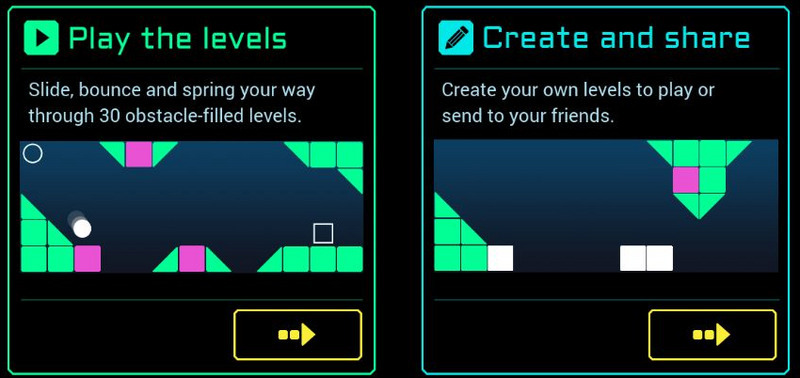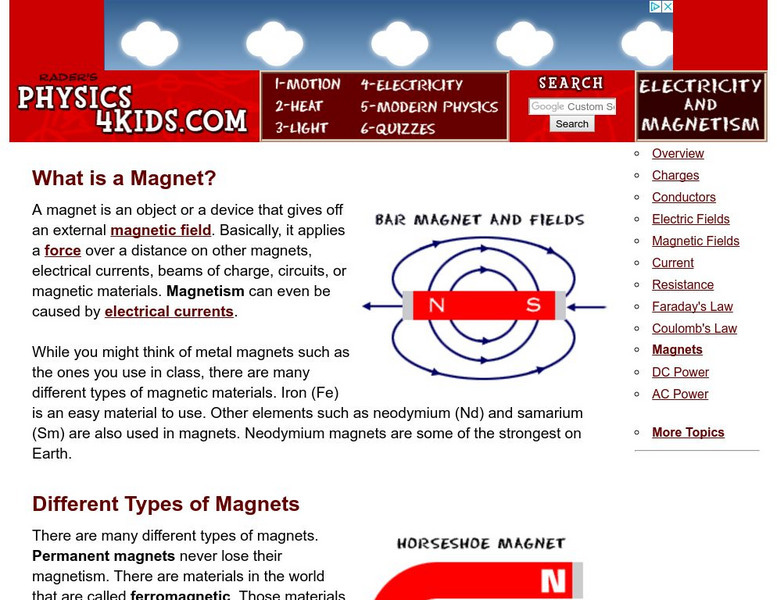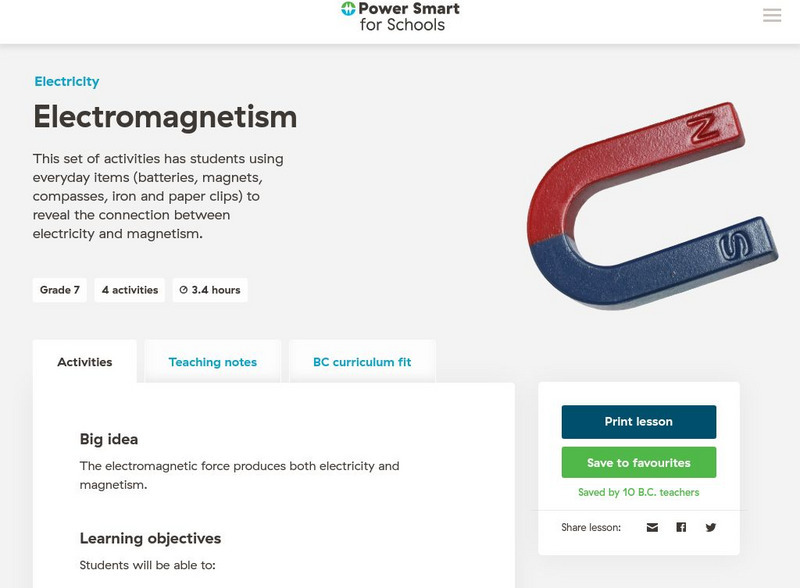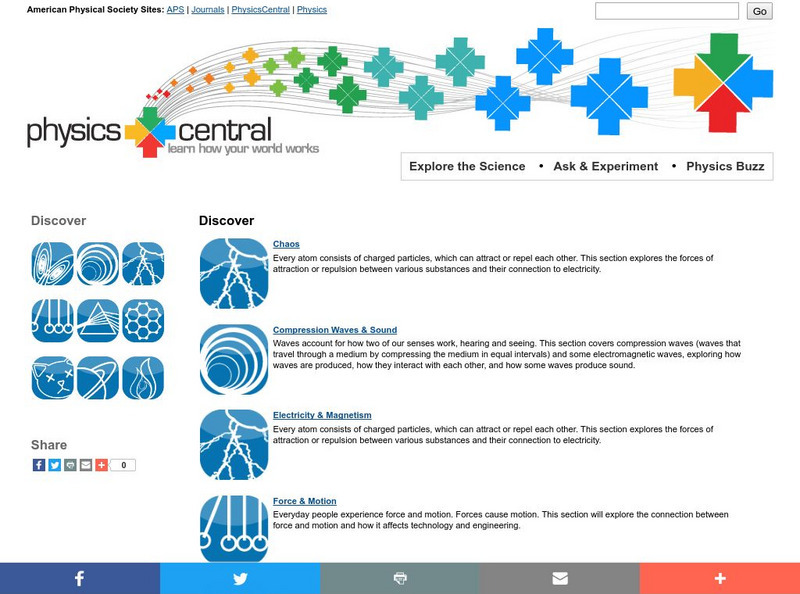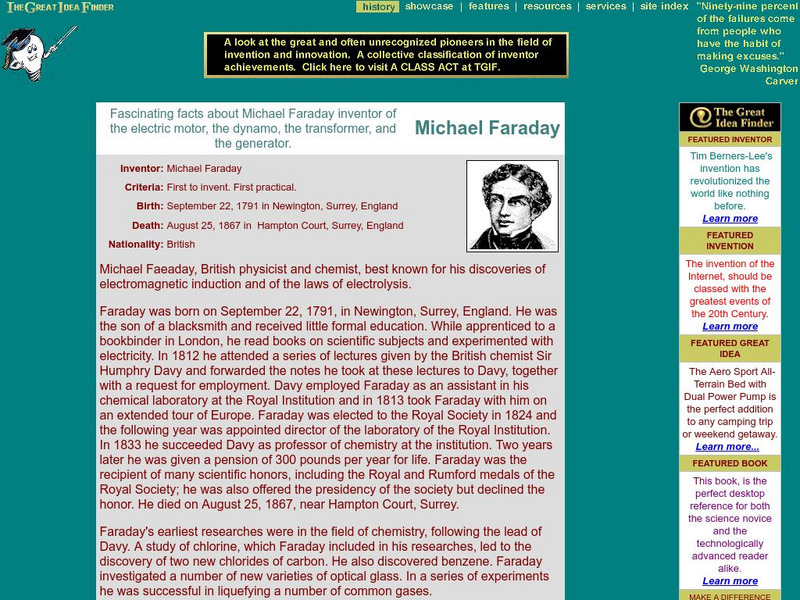Science Museum, London
Science Museum: Launchpad Online: Launchball
Use your knowledge of physics concepts like electricity, reflection, magnetism, etc. to complete interactive online puzzles.
Vision Learning
Visionlearning: Physics: Light Ii: Electromagnetism
Instructional module focusing on light and electromagnetism. Discussion includes historical discoveries that led to the understanding of the electromagnetic spectrum. Site also includes an interactive practice quiz and links relating to...
Physics4kids
Physics4kids: Electricity and Magnetism: Magnets
Here is the site to help you learn all about magnetism and magnets! Find out what a magnet is and how it works. Click for additional details on charges, conductors, magnetic fields, currents, resistance as well as the Laws of Faraday and...
Science Buddies
Science Buddies: Levitating Magnets: Floating Isn't Just for Magicians
If you ever seen a magician float an object in the air, you might think that levitation is just a magic trick, but the truth is you can use an invisible physical force to levitate a magnet. Try this simple, week-long science project to...
Massachusetts Institute of Technology
Mit: Open Course Ware: Courses: Physics: Electricity and Magnetism
College-level physics course highlighting electromagnetism. This course also includes a wide variety of other physics topics including lightning, electrocardiograms, metal detectors, and atom smashers, to name a few. Course includes a...
TeachEngineering
Teach Engineering: Slinkies as Solenoids
In this activity, students use an old fashion children's toy, a metal slinky, to mimic and understand the magnetic field generated in an MRI machine. The metal slinky mimics the magnetic field of a solenoid, which forms the basis for the...
University of St. Andrews (UK)
University of St. Andrews: Charles Augustin De Coulomb
A large complete authoritative biography of Coulomb. Five large pictures, over a dozen links to contemporaries, references, a poster, other mathematicians. A fine source.
University of St. Andrews (UK)
University of St. Andrews: Andre Marie Ampere
Resource provides a biography of the scientist Andre Marie Ampere.
The Wonder of Science
The Wonder of Science: 3 Ps2 4: Magnetic Design Solution
See work samples, phenomena, and assessment templates that directly address standard 3-PS2-4: designing a magnetic solution.
Other
Bc Hydro: Power Smart for Schools: Electromagnetism
This set of activities has students using everyday items (batteries, magnets, compasses, iron and paper clips) to reveal the connection between electricity and magnetism. Ideally, students will already have experience building simple...
University Corporation for Atmospheric Research
Ucar: The Sun Earth Connection: Exploring the Dynamic Nature of the Sun
The unit contains lessons and a presentation that allow students to explore the Sun through images and investigate how magnetism from the Sun interacts with the Earth's magnetic field during space weather events.
OpenSciEd
Open Sci Ed: 8.3 Forces at a Distance
This unit allows students to investigate the cause of a speaker's vibration in addition to the effect.
Science Buddies
Science Buddies: How to Make a Homopolar Motor
In this quick activity, you will make a simple motor using nothing but a battery, magnet, and a piece of wire.
Other
Stile: 2.1 Lesson: Electromagnetism (Part 1)
This is a sample lesson on electromagnetism. It includes animated diagrams, interactive exercises, an audio option for reading the text, and comprehension questions throughout where students can type their answers or pick from...
Georgia State University
Georgia State University: Hyper Physics: Electricity and Magnetism
Georgia State University provides an indexing page for several other pages at the same site which contain information on electricity and magnetism concepts. Pages linked from this page contain many informative graphics, equations,...
Florida State University
Florida State University: Lightning, a Natural Capacitor
Text and animated graphic show how lightning is an example of a natural capacitor.
NASA
Nasa: Oersted and Ampere Link Electricity
NASA provides a nice blending of the achievements of three scientists, Oersted, Ampere, and Maxwell. This done by NASA-sponsored International Solar-Terrestrial Physics group. Lots of pictures, diagrams, and scientific explanation. Good...
Physics Central
American Physical Society: Physics Central: Discover Homepage
Link to nine major physics topics and dig deeper into the content. Find out about the work of scientists in each field and see example physical science experiments.
Massachusetts Institute of Technology
Mit: Open Course Ware: Courses: Physics: String Theory for Undergraduates
College-level physics course focusing on the string theory. The course develops the aspects of string theory and makes it accessible to students familiar with basic electromagnetism and statistical mechanics. Course features include...
Georgia State University
Georgia State University: Hyper Physics: Ferromagnetism
This site from the Georgia State University provides a good overview of ferromagnetic materials, introducing concepts such as magnetic domains, hysteresis, the curie temperature, and magnetostriction.
Georgia State University
Georgia State University: Hyper Physics: Magnetic Properties of Solids
This site from the Georgia State University contains a good overview of some of the magnetic properties that are common to all materials, such as susceptibility and permeability, and then specific discussion of both diamagnetic and...
E-learning for Kids
E Learning for Kids: Science: Greece: What Is a Magnet?
Go on a scavenger hunt mission with Tatiana and her father at the famous Greek theater, and learn more about magnets.
E-learning for Kids
E Learning for Kids: Science: Italy: How Are Magnets Made?
Paolo works in a Pizzeria. He is trying to make his own magnets. Join him and help him learn.
Great Idea Finder
The Great Idea Finder: Michael Faraday
A solid biography of good length and history of Faraday's work. Complete, readable, thorough. Picture. Lots of links to other sources, including Joseph Henry's claim that *he* was first, and another about Faraday's kinetic flashlight!


